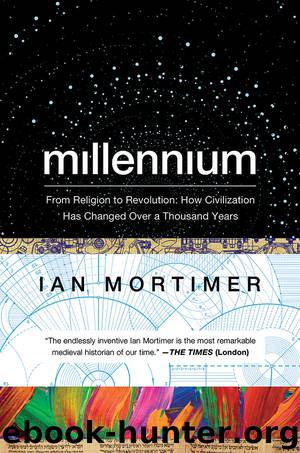Millennium by Ian Mortimer

Author:Ian Mortimer [Mortimer, Ian]
Language: eng
Format: epub
Publisher: Pegasus Books
Published: 0101-01-01T00:00:00+00:00
Enlightenment liberalism
Immanuel Kant described the Enlightenment as the ability to think for oneself, free from convention and dogma. Given such a broad definition, it is hardly surprising that it has been treated as an enormously elastic term. It is frequently taken to be a synonym for all the changes that distinguish the breezy, elegant world of Jane Austen’s novels from the dark depths of the witch-burning seventeenth century. It is an intellectual bucket into which scientific concepts and rationalist theories are idly tossed, along with the rise of political economy and the decline of superstition. In that general sense, the Enlightenment started with Francis Bacon and Galileo in the early seventeenth century, incorporated the Scientific Revolution in its entirety, and did not come to an end until after the fall of Napoleon in 1815. This clearly is too vague a definition and too long a time span. For the purposes of this book, therefore, two intellectual changes frequently treated as elements of the Enlightenment are here dealt with separately: liberalism and economic theory.
At the heart of the Enlightenment was the 28-volume Encyclopédie, edited in Paris by Denis Diderot andJean-Baptiste le Rond d’Alembert. This work, which was in the press for nearly twenty years (1752–71), was like an eternal flame around which the butterflies of genius fluttered – among them Montesquieu, Voltaire, Jean-Jacques Rousseau, Turgot and Louis de Jaucourt (who wrote a quarter of the Encyclopédie single-handedly). But the whole project was much more than the sum of its parts: it was an attempt to realign mankind’s relationship with the natural world exclusively along the lines of reason, without recourse to magic, superstition or religion. Dividing all knowledge into three branches – memory, reason and the imagination – the editors created a taxonomy that left no room for matters such as divine will or spiritual intercession. Their purpose can be summed up in the single thematic heading to which they subjected the entire work: understanding.
Underpinning the ambitions of the editors and contributors was a self-perpetuating concept of social progress. Turgot explained this in his Philosophical Review of the Successive Advances of the Human Mind in 1750. He started off with the premise of deism: that God was the ‘prime-mover’ of the universe – a concept that Thomas Aquinas had originally offered in the thirteenth century as part of his proof for God’s existence. In the language of the Enlightenment, God was the great clockmaker who had simply set the world going and then left it alone. Slowly humanity had emerged from its state of nature and passed through three stages – hunter-gatherer, pastoral and agricultural – until finally arriving at the fourth and final stage, the commercial. Along the way, the ability to generate ever greater agricultural and manufacturing surpluses had facilitated the transition from one stage to the next. For Turgot, the evidence that this was indeed ‘progress’ lay in the fact that mankind was constantly adding to the existing body of knowledge. Thus humanity would continue to advance forever more, he reasoned, on account of it being in our nature to enquire into things.
Download
This site does not store any files on its server. We only index and link to content provided by other sites. Please contact the content providers to delete copyright contents if any and email us, we'll remove relevant links or contents immediately.
| Africa | Americas |
| Arctic & Antarctica | Asia |
| Australia & Oceania | Europe |
| Middle East | Russia |
| United States | World |
| Ancient Civilizations | Military |
| Historical Study & Educational Resources |
Underground: A Human History of the Worlds Beneath Our Feet by Will Hunt(12097)
Sapiens by Yuval Noah Harari(5369)
Navigation and Map Reading by K Andrew(5156)
The Sympathizer by Viet Thanh Nguyen(4390)
Barron's AP Biology by Goldberg M.S. Deborah T(4150)
5 Steps to a 5 AP U.S. History, 2010-2011 Edition (5 Steps to a 5 on the Advanced Placement Examinations Series) by Armstrong Stephen(3733)
Three Women by Lisa Taddeo(3433)
Water by Ian Miller(3184)
The Comedians: Drunks, Thieves, Scoundrels, and the History of American Comedy by Nesteroff Kliph(3079)
Drugs Unlimited by Mike Power(2594)
A Short History of Drunkenness by Forsyth Mark(2297)
DarkMarket by Misha Glenny(2212)
And the Band Played On by Randy Shilts(2209)
The House of Government by Slezkine Yuri(2206)
The Library Book by Susan Orlean(2069)
Revived (Cat Patrick) by Cat Patrick(1991)
The Woman Who Smashed Codes by Jason Fagone(1973)
The Absolutely True Diary of a Part-Time Indian by Sherman Alexie(1913)
Birth by Tina Cassidy(1903)
